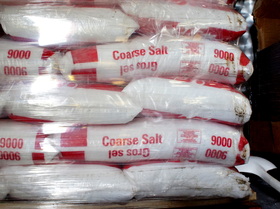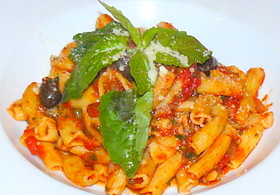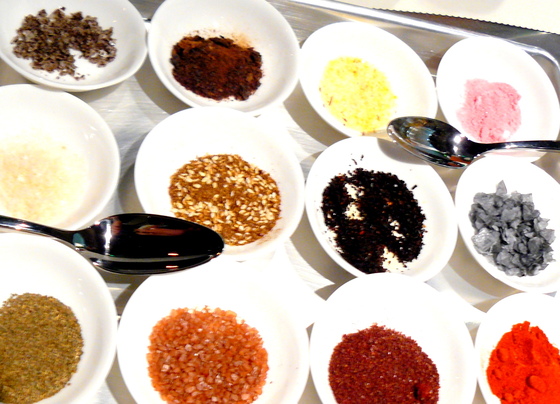Let's get this out of the way upfront: the VP for Science & Research for the Salt Institute is named Morton Satin. Seriously, Morton. But he's been saying for years that salt has a bad rap, unfairly demonized for America's dietary sins, for our society's obesity, high blood pressure and heart disease.
Pooh, we think; Morton is just a shill, reciting the salt-party's party line. His goal is to sell more salt, so we pay no heed.
But pay heed we should. The scientific "evidence" that salt is responsible for hypertension (leading to obesity and heart disease) is flimsy at best. The New York Times ran a popular op ed Sunday on this lack of solid, anti-salt science. In fact, eating less salt causes the kidneys to increase produce of renin, which can actually increase the risk of heart disease.
 The salt levels in modern processed foods don't hold a candle to the traditional salt processed foods we used to eat and that are still consumed in many parts of the world. Salt consumption is considerably higher in the Mediterranean than the US, and nobody suggests that the Mediterranean diet "causes" heart disease. Quite the contrary.
The salt levels in modern processed foods don't hold a candle to the traditional salt processed foods we used to eat and that are still consumed in many parts of the world. Salt consumption is considerably higher in the Mediterranean than the US, and nobody suggests that the Mediterranean diet "causes" heart disease. Quite the contrary.
That's the dirty little secret about the Mediterranean diet. The original, seven-country study that showed the cardiovascular benefits of the Mediterranean diet, neglected to mention its very high salt content.
In an email earlier this year, Satin wrote that "The majority of research conducted over the past few years and published in accredited peer reviewed journals specifically cautions against lowering salt consumption for individuals." Why would that be? These are peer-reviewed studies, after all. Yet, he continues, "the detrimental health effects of doing so include increased morbidity and mortality from Type I and Type II diabetes, insulin resistance, cardiovascular disease and heart failure."
For example, the authors of a recent report on sodium levels in fast food failed to note that in many countries (the Mediterranean region, Asia), salt consumption is higher than in the United States and so is life expectancy and general health. Asian fish sauce and soy sauce, contain very high levels of sodium, but they don't seem to be harmful or detrimental to longevity. So why, we can only ask, do American scientists make Morton's salt the bogey-man?
I suggest that it's this country's Prohibitionist mentality. We see a problem like public drunkenness and outlaw liquor. (On the other hand, we don't respond to violent lawlessness by outlawing firearms.) We see obesity, and impose draconian measures to limit salt (or, in New York City, proposing to limit the serving size of sugary drinks).
We fail to recognize that salt has a valuable function, not just as a preservative of foods like fish and meat but as a vital ingredient that enhances the taste of food. A decade ago, the Mark Kurlansky wrote an enthralling book titled, simply, Salt, which argues that the quest for salt is responsible for much of the world's history.
 "Americans are afraid of salt," laments Enza Sorrentino, whose full-flavored Sicilian dishes at her eponymous restaurants on Queen Anne were occasionally described as "too salty" by customers with palates were accustomed to bland American sauces. Or worse: covering salty flavors with gobs of cream-based sauces. "Troppo panna!" says Enza, too much cream.
"Americans are afraid of salt," laments Enza Sorrentino, whose full-flavored Sicilian dishes at her eponymous restaurants on Queen Anne were occasionally described as "too salty" by customers with palates were accustomed to bland American sauces. Or worse: covering salty flavors with gobs of cream-based sauces. "Troppo panna!" says Enza, too much cream.
Cooking pasta in water with the salinity of the ocean, as is done throughout the Mediterranean, requires a tablespoon of salt per quart, but few American cooks would add half a cup of salt into a gallon of boiling water. Very little of the salt gets into the spaghetti, mind you, but there's a psychological barrier that's hard to overcome.
Yet a well-made pasta puttanesca is full of salty (and flavorful) ingredients. In addition to the noodles, there's salt in the tomato sauce, in the anchovies, in the olives, in the capers. There's a ton of salt in cured meats: the pancetta of a spaghetti carbonara, the guanciale (pork cheeks) of an amatriciana.
But it's not as if Sicilians (or Italians in general) deliberately add salt. To the contrary, they never, ever put salty butter on fish; just a squeeze of lemon. Basta!

As a culinary instructor, I have been praising the benefits of sea salt for many years. I love seeing the remarks about the salinity of the sea for pasta water. Many of my students freak when they see how much salt I use for pasta water yet my pasta never tastes salty. Thanks for the article.
queenjeannescuisine.wordpress.com